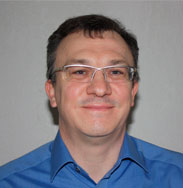
Mars mission and astronauts self-supported life
Cristophe Lasseur
European Space Agency
The MELiSSA (Micro-Ecological Life Support System Alternative) project was initiated in 1989, as a tool to gain understanding of closed life support, as well as the development of the technology for a future life support system for long term manned space missions, e.g. a lunar base or a mission to Mars.
The collaboration was established through a Memorandum of Understanding (i.e MOU) and is managed by ESA. It involves roughly 30 organisations, 11 of these organisations have signed a Memorandum Of Understanding. It is co-funded by ESA, the MELiSSA partners, local, regional and national authorities. The driving element of MELiSSA is the production of food, water and oxygen from organic waste (inedible biomass, CO2, urea,…). Inspired by the principle of an “aquatic” ecosystem, MELiSSA process comprises several processes, called compartments, from the anoxygenic fermenter up to the photosynthetic one (i.e. algae and higher plants). The choice of this compartmentalised structure is required by the very high level of safety requirements and justified by the need of an engineering approach and to build deterministic control strategy.
During the past 25 years of research and development, a very progressive approach has been developed to understand, simulate, test and control the MELiSSA loop. This approach starts from the selection of processes, their characterisation and mathematical modelling, the validation of the control strategy, up to the demonstration on Earth, at pilot scale and leads to preliminary flight experiments. Its includes as well the stress detection issues and the potential evolution of the metabolic pathways, mainly via the use of biomolecular techniques.
This presentation recalls the main features of the project and summarises the recent achievements.
Curriculum
Dr Christophe Lasseur -
European Space Agency
Coordinator of Life Support R&D activities
Head of MELiSSA project
ESA representative of the International Space Station medical board: Microbial safety
ECLSS Certified instructor for European astronauts
PhD in bio- Engineering from Compiegne University of Technology (F)